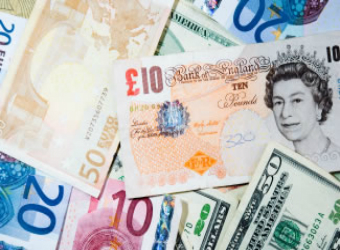The British pound sterling broke above the $1.35 mark during Friday morning but political uncertainty could undermine its performance.
Sterling hit a 14-month high as traders bet the prospect of an interest rate hike had increased. At about 11.30 a.m. London time, sterling was at $1.3606, up by 1.5 percent.
The Bank of England (BoE) indicated Thursday interest rates may rise in the “coming months.” Adding to the mood, one of the most dovish members of the bank, Gertjan Vlieghe, said on Friday morning that the moment when the bank decides to raise rates is approaching.
Richard Falkenhall, senior FX strategist at SEB, told CNBC that the hawkish comments helped strengthen the pound following a raft of bad news over the past few months.
“The weakness of the GBP during summer reflects that a lot of bad news had been priced into it. Growth forecasts have been lowered and the Brexit negotiations have not shown any progress. Given these expectations it comes as no surprise as it reacts positively on some positive news in recent weeks and what seems like tighter monetary policy,” he said.
One of the recent key moments for the sterling was the June election. The currency slid as much as 2.3 percent to $1.2690 after the snap election, which meant the ruling Conservative party lost its parliamentary majority weakening the U.K.’s position in exit talks with the European Union.
At the same time, the ongoing Brexit negotiations have also dragged the currency lower. British and European officials have made little progress in talks over the summer and the next round has been delayed by a week.
Brexit uncertainty has spread concerns over a potential cliff edge exit – meaning that both sides won’t reach an agreement, which would raise trade tariffs and costs for businesses in the U.K.
“Over the medium term we believe it is too early to expect a substantial recovery at this point. That said, we would turn more long-term positive on the GBP if Brexit negotiations showed some real progress in coming months,” Falkenhall said.
Jane Foley, head of FX strategy at Rabobank, also told CNBC that “the market has built sizeable short positions in the pound since the EU membership referendum last June, which has made sterling more susceptible to positive surprises.”
“At the same time, the market chose to largely ignore the hawkish takeaways that have been evident in its rhetoric since the May Inflation report,” she noted.
At the time the BOE said that inflation is likely to overshoot to 2.7 percent in 2017 “entirely” due to the impact of a weak sterling.
“GBP, however, is still vulnerable to political uncertainty. With the prospect of a cliff edge Brexit looming in 18 months, we see scope for further downside pressure in the pound vs the EUR medium term,” Foley told CNBC.
Stephen Gallo, European head of FX strategy at BMO Financial Group, added: “At this stage, I would say that the BoE is probably no more certain than the FX market regarding when (exactly) it will move on rates. This will depend on the domestic U.K. economy, the path of Brexit negotiations and the pace of EUR appreciation as the ECB tapers.”
However, he suggested that GBP is a short-term buy. “In the near-term, FX (currency) investors should look to buy GBP here in anticipation of further gains, as positioning in the market is skewed towards further liquidation of GBP shorts. This will probably bring the 0.8750/0.8800 range into view in EURGBP, at which point the market will be in a bit better balance,” he said.
Source: CNBC


